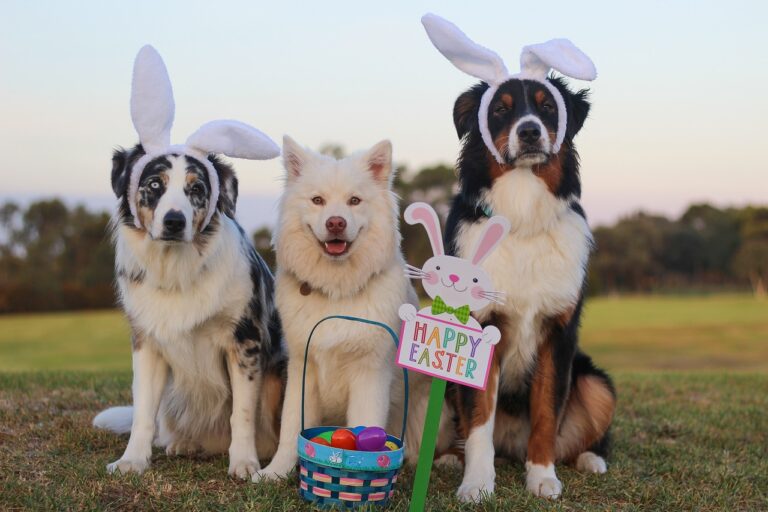
Easter is a time of joy, celebration, warmer weather and, of course, lots of chocolate! But it also brings potential hazards for our furry friends. Pets, curious and eager to explore, may find themselves in risky situations, whether it be around certain foods or even out in the beauty of nature. In this article, we’re highlighting some of the common Easter dangers for pets and tips on how to keep them safe.
Generally, at this time of year, there’s no shortage of sweet treats in our homes, though this does mean there are more opportunities for our pets to get their paws on whatever they may find lying around.
Surveys by the British Veterinary Association (BVA) have found that around three in five vets treated pets for chocolate poisoning during the Easter holidays. These stats have changed very little over the years, indicating that more needs to be done to highlight the danger chocolate poses to pets.
Chocolate and sweets are toxic to both dogs and cats, containing substances like theobromine, xylitol and caffeine that can cause side effects like vomiting, diarrhoea, rapid breathing and increased heart rate, among others. Symptoms can take anywhere between 4-24 hours to show, so it’s really important to get in touch with your vet immediately if your pet has eaten anything they shouldn’t have.
Dogs are typically the ones who are most tempted, as cats and rabbits can’t taste the sweetness, but it’s best to keep any Easter eggs and other human treats far out of reach in fridges, cupboards or drawers.
While spring is a time where our gardens and homes brighten up with beautiful blooms, it can also pose a serious problem in cases where some plants are toxic to our pets.
For an extended list of plants that are harmful to pets, please read our other articles:
They’re an Easter favourite for us humans, but come with a word of warning: don’t share these with your pets! Raisins and sultanas, along with many other dried fruits, are known causes of kidney failure in both cats and dogs, even it’s just a small quantity.
If you arrange an Easter egg hunt in your garden, just make sure that all have been found before you let your dog outside, as they’ll easily find any that have been left behind. Even if you’ve used plastic or hard boiled eggs instead of chocolate ones, these can still be harmful, causing blockages or other digestive issues.
The hustle and bustle of Easter celebrations can be overwhelming for pets – particularly if travel is involved. Many pets don’t respond well to changes in routine, which can cause stress. Look out for changes in their behaviour, including becoming withdrawn or more reactive, panting and shaking, or needing the toilet more than usual.
We hope you and your pets have a safe and wonderful Easter!
If you suspect your pet may have eaten something they shouldn’t have, please get in touch with your local St Kitts practice:
St Kitts Vets Hartley Wintney: 01252 844044
St Kitts Vets Basingstoke: 01256 844944
Crookham Park Veterinary Centre: 01252 913990
Firgrove Veterinary Centre: 01252 877799

At St Kitts, we’re proud to be creating a more sustainable future. As veterinarians, we’re conscious we have a responsibility to protect the environment, to ensure the health and welfare of animals both locally and around the world.
That’s why we’ve teamed up with Carbon Footprint, to embark on an exciting new project to plant trees to offset our carbon emissions and put a vital new sustainability policy in place.
As part of our new sustainability policy, we’ve planted 4 trees in the South East of England, one for each of our branches. By doing this, we’ve successfully offset 4 tonnes of carbon (4 tCO2e).
And we now have the certificates to prove it! Each is endorsed by Verified Carbon Standard (VCS) approved carbon credits, to guarantee carbon offsetting through verified carbon reduction projects and tree planting initiatives.

Trees are the longest living species on earth and are vital to maintaining our biodiversity and climate. Some Oak trees live for over 1000 years, serving as essential long-term carbon stores.
By planting trees, we’re benefiting local communities and aim to inspire future generations to reduce their environmental impact, which is a crucial part of our Corporate Social Responsibility commitment.
As a veterinary group, we’re proud to take proactive steps towards being environmentally responsible, prioritising animal welfare and the planet.
In addition to planting trees, we’ve implemented a new sustainability policy, in line with Vet Sustain’s Greener Veterinary Practice Checklist, to minimise the environmental and carbon footprint of all our veterinary services and operations.
By the end of 2025, our goal is to reduce carbon emissions across our four practices by 10%.
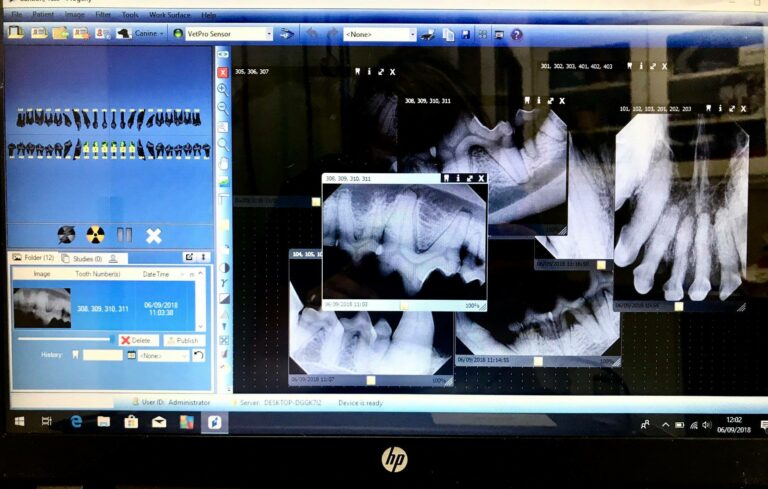
Pet dental care is just as important as brushing teeth twice a day is to us humans!
Preventative care is key to helping prevent the build-up of tartar, reduce the risk of tooth decay and gum disease, and prevent discomfort and pain.
Our fully equipped practices enable our veterinary surgeons to diagnose and treat a range of dental conditions. We have state-of-the-art facilities, including:
Poor dental health can cause problems for pets, with some of the most common symptoms including:
We recommend brushing your cat’s and dog’s teeth daily and providing them with a partially dry diet, including hard biscuits, which are particularly effective at removing plaque. We can also advise on products to help reduce plaque build-up and bad breath.
When it comes to dental treats, these should be given in moderation, as many can be high in calories.
Unlike cats and dogs, rabbit’s teeth continue to grow throughout their lives; this can lead to additional dental concerns. Providing a high fibre diet and encouraging chewing is central to ensuring that a rabbit’s teeth remain healthy, however; it is important to have regular dental checks in order to spot any potential problems early.
If a rabbit does not eat enough fibrous food to wear down the growing teeth or the teeth are misaligned for any reason, they can become overgrown and dig into the soft tissue of the mouth, causing pain and preventing the rabbit from eating properly.
Sings of dental disease in rabbits are similar to those seen in cats and dogs such as:
To fully examine the mouth, the vet will need insert a small scope into the rabbits mouth to visualise the cheek teeth. This can be done in a consultation and is not painful.
Our Pet Healthcare Plans are designed to save you money by spreading the cost of routine and preventative treatment with low monthly payments.
Members get access to exclusive discounts on products and services at St Kitts Vets, including dentals, neutering and our in-house laboratory.
Additional benefits include:
*Tick control included with Plus Plans only.
Sign up today and start saving!
If you have concerns about your pet’s teeth, please book a consultation online or contact your local St Kitts practice immediately.
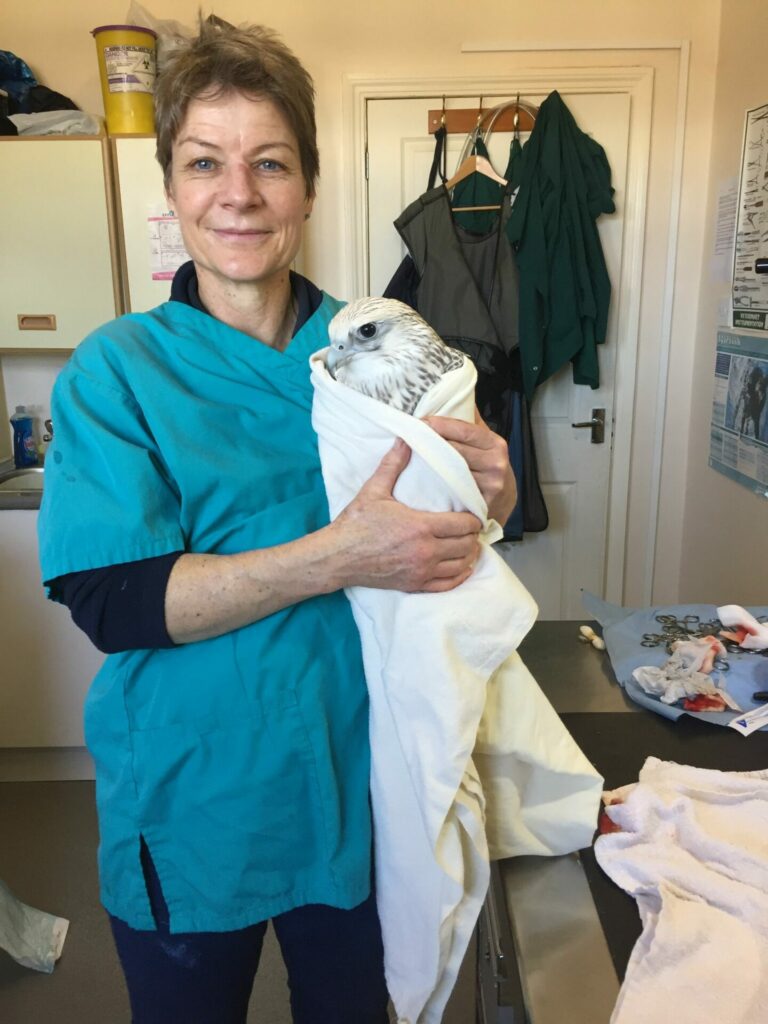
Birds can be great for those who are looking for a pet that is intelligent and charismatic. From small budgies to exotic parrots and macaws, they make lovely companions, but do come with their own individual nutrition and socialisation requirements.
Here at St Kitts Vets, we offer advice, consultations and treatment for all types of birds. Vet Edda Pohlandt has a special interest in this area, particularly birds of prey, and is keen to see more avian cases from our Basingstoke clinic.
It’s common for pet birds to hide symptoms of illness, so we therefore recommend that regular health checks (every 6-12 months) are carried out by a vet to ensure they remain happy and healthy.
We are fully equipped at our small animal practices to treat a range of avian conditions, with our facilities allowing us to carry out surgery and complete diagnostics such as X-rays and blood sampling.
We can also carry out consultations and appointments for:
For appointments and to talk to our team about any concerns you have about your pet bird, please get in touch with your local practice.
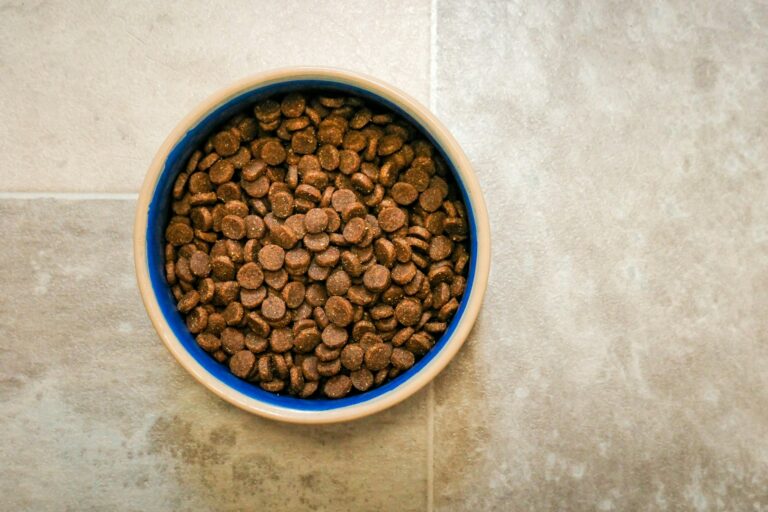
It may surprise you to hear that 65% of dogs and 39% of cats in the UK are either overweight or obese – something that is definitely a growing concern.
In fact, a recent study found the average dog is being overfed by 54,000 calories a year – that’s the equivalent of a human consuming 402 burgers!
To help you keep your pet a healthy weight, we consulted with the team at St Kitts to put together their top tips. It’s important to note that your pet’s specific breed characteristics will need to be considered individually, as all will have varying body types.
A subtle change to your pet’s physical appearance can be a sign your pet is becoming overweight. To check, see if you can easily feel your pet’s ribs without pressing too hard. If you can’t feel them, this may mean your pet is overweight.
Look at your pet – if there is no distinct waist or if it appears to be bulging, your pet may be carrying excess weight. Having a noticeable waist, between the ribs and hips, is a healthy sign.
A slight tuck in the abdomen is normal for many pets. If there is no discernible tuck or if the belly hangs down, it could indicate excess weight.
If your pet seems to be lacking in energy and unwilling to play or explore, it could be a sign that excess weight is causing them discomfort when actively moving about.
If your pet is having difficulty moving around, jumping or exercising, it might be due to excess weight. Observe their activity level and consult your vet if there are any concerns.
Feed your pet a well-balanced and nutritional diet, suitable for their age, size and breed. You can always ask your vet for advice on the appropriate type and amount of food for your pet.
Keep track of your pet’s weight over time. Sudden or consistent weight gain could be a sign of an issue. Regular visits to your vet for weight checks can help monitor this.
Be observant – keep an eye on what your pet is eating, as it might be more than you think! If you make any changes to their diet, check their weight and monitor their progress.
Be mindful that leftovers aren’t really meant for pets, especially ones with a high fat content; It can be easy to pile on the pounds when regularly feeding them bits and pieces. Eating inappropriate food can also lead to the development of other conditions, such as pancreatitis.
A new lower calorie diet could be key to helping your pet lose weight. Be sure to check with your vet before introducing a new diet to make sure it’s appropriate.
Treats are great as a reward, but they should be just that, a treat, not part of your pet’s regular diet. Take care to only offer treats intended for pets and opt for healthier alternatives to keep the calories under check.
Regular exercise is an important part of staying fit and healthy. It’s reported that 44% of dog walks are less than 30 minutes, with 13% of dogs not being walked every day.
If you’ve noticed your dog is gaining weight, simply extend their walk by ten minutes, or take them out for another short walk during the day to help them burn fat. Interactive toys are another great way for your pet to burn calories.
Instead of leaving food out all day, establish a feeding schedule. This allows you to control the portions and monitor your pet’s eating habits.
Measure your pets food to avoid overfeeding. Follow the feeding guidelines provided by the pet food manufacturer, and adjust as necessary based on your pet’s activity level and age.
Consistency is key to maintaining a healthy weight for your pet. Stick to their feeding and exercise routine to avoid your pet becoming overweight and don’t be afraid to raise any concerns with your vet.
At St Kitts, we offer Weight Clinics run by our expert Veterinary Nurses for pets who are overweight, providing plans to suit the individual needs of the pet.
Our team will organise regular weigh-in appointments and can provide owners with expert advice on diet and exercise.
If you have concerns about your pet’s weight, contact your local St Kitts practice immediately:
St Kitts Vets Hartley Wintney: 01252 844044
St Kitts Vets Basingstoke: 01256 844944
Crookham Park Veterinary Centre: 01252 913990
Firgrove Veterinary Centre: 01252 877799

As a veterinary group, we’re proud to be taking steps to become more environmentally responsible and do our bit for the planet. Collectively, small changes can have a big impact!
Our veterinary activities, services and operations all contribute to our environmental and carbon footprint, so we’ve been working behind the scenes to introduce a new sustainability policy in line with Vet Sustain’s Greener Veterinary Practice Checklist.
Through the implementation of this policy, we aim to encourage wide reaching participation in an effort to reduce our impact, whilst upholding the highest standards of animal health, welfare and clinical care for our patients.
By the end of 2025, we hope to have reduced our carbon emissions across our four practices by 10%. We are committed to this journey of continual improvement by:
As veterinarians, we have a responsibility to protect the health and welfare of animals, including taking steps to protect the environment many live in. While there will be many more ways we can and will continue to improve, we hope this to be a significant milestone in our journey to operating more sustainably.
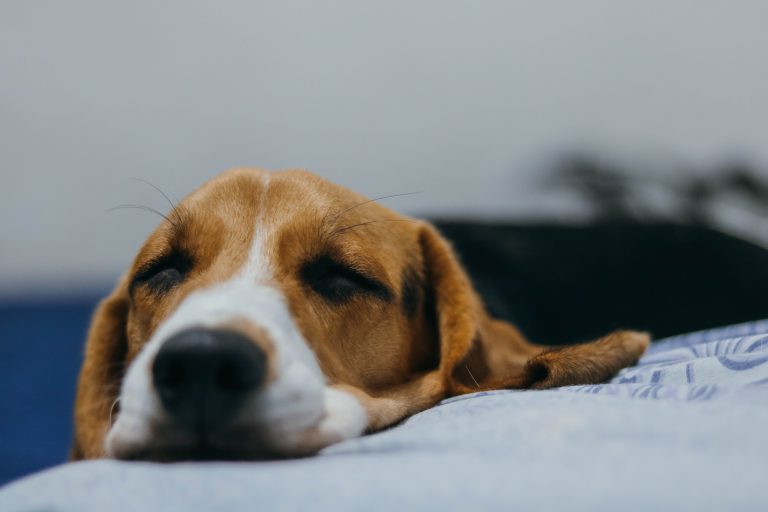
We know and understand that going through treatment for your pet can be a worrying time. Insurance claims can add to this, which is why we are proud to support our clients with both direct and indirect claims.
A direct claim is where your insurance company reimburses your practice.
We are one of the only vets in the area that handles direct claims on behalf of our clients. This means we take care of everything, including holding monies owed so that you don’t have to pay your vet bill immediately following treatment.
An indirect claim is where your insurance company reimburses you directly.
To support us in continuing the provision of this service for clients, we are introducing a small £10 admin fee with each claim made. This will come in from 1st January 2024.
We understand that you may have some questions regarding the changes so, to help, we have answered some of these below.
Owners will be asked to pay the admin fee at the time of handing in the insurance form / making the claim request. Payment will be taken alongside the insurance excess payment, if applicable.
Yes. As processing a pre-authorisation requires the equivalent amount of work and attention to detail as processing a standard claim, the admin fee will apply.
The fee will be charged at the time of the pre-authorisation request and includes the processing of the associated claim if authorisation is granted. The fee is not refunded if authorisation is not granted by the insurance company.
If multiple claims are processed for the same pet at the same time, just the one admin fee (£10) will apply.
Yes. Our admin fees are charged per pet, i.e. £10 invoiced for Bill and £10 for Ben.
No. The insurance admin fee covers the submission of a new claim and 1 subsequent continuation claim within 6 months OR for ongoing claims, the fee covers 2 continuation claims within 6 months.
N.B. Where there is a previous agreement between the Insurance Team / Practice Manager and client to automatically process low value (under £100) continuation claims, e.g. regular repeat dispensing of Loxicom, our Insurance Team will continue to process these claims FOC until the policy year renews. At this point, an admin fee will then be due alongside the insurance excess payment.
Yes. Our Insurance Team are still required to check the claim details, provide the requested information, answer any additional questions and track the progress of the claim therefore, the fee is still applicable.
Yes. This is because our Insurance Team are still required to check the claim details, provide the requested information, answer any additional questions and track the progress of the claim.
If you have any further questions about the admin fee, please get in touch with the team at your local practice.
St Kitts Vets Hartley Wintney: 01252 844044
St Kitts Vets Basingstoke: 01256 844944
Crookham Park Veterinary Centre: 01252 913990
Firgrove Veterinary Centre: 01252 877799
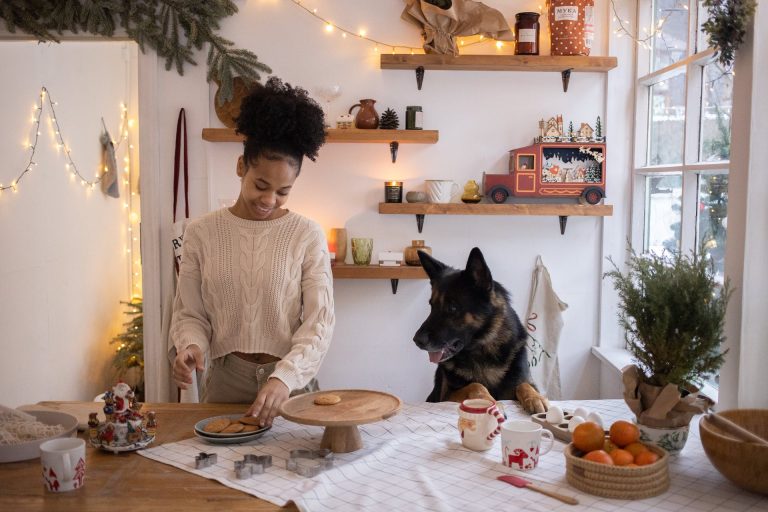
Over the Christmas period, we all like to tuck into some festive treats and it can be hard to say no to the puppy eyes and pawing at your leg from pets who are desperate to have a taste for themselves. However, while dinners with all the trimmings will go down a hit with us humans, there are a number of items that can be harmful to our pets.
To guide you through a safe and merry Christmas with your pets, we’ve put together a list of foods that may not agree with our pets’ digestive systems and should therefore be kept out of paw’s reach.
The caffeine found in everyday items such as coffee beans, tea bags and fizzy drinks can cause your pets harm. It’s important to keep them stored securely to avoid causing heart palpitations, rapid breathing and restlessness.
Be mindful of everyone’s festive favourite – chocolate – as the stimulant Theobromine found in this is poisonous to your pet. It can affect their digestive, heart and central nervous systems, causing symptoms such as vomiting, diarrhoea, restlessness, hyperactivity and seizures. In some cases, these effects can be fatal.
It’s common to want to share the odd tidbit with your pet while you’re cooking, but bones can be a big hazard, as they’re prone to splitting and can sometimes scratch or get lodged into your pet’s throat, as well as fracture their teeth.
Salmonella may also be present in raw bones, which is equally as dangerous and can cause vomiting, diarrhoea, abdominal pain, loss of appetite, lethargy and fevers. It’s best not to share bones, particularly raw ones, to avoid any complications.
Large chunks of corn on the cob can be hard for your pet to digest and may cause serious blockages that often require emergency surgery. Symptoms to watch out for include vomiting, loss of appetite, constipation or diarrhoea and stomach ache.
Most pets will find it difficult to properly digest the lactose in milk and cheese products, so it’s safer if you avoid giving them dairy altogether. In some cases, dairy can cause vomiting, diarrhoea and potential skin allergies.
Particular types of blue cheese, such as Roquefort, produced using a fungus that pets are commonly sensitive to. In extreme circumstances, animals can quickly develop muscle tremors and seizures.
Fortunately, there are plenty of pet-friendly alternatives you can try for a healthy and balanced diet, without the risk of digestive issues or allergic reactions associated with dairy consumption.
Although small in size, fruits like grapes, raisins and sultanas are toxic and can cause diarrhoea, vomiting, lethargy and dehydration. In serious cases, these symptoms can lead to kidney failure, which is often fatal. Common festive treats like mince pies, stollen and Christmas pudding should be kept safely away, as they’re packed with these fruits.
In general, it’s not advisable to give your pet any nuts, but this is especially important with macadamia nuts, as they are the most toxic. It can take just 12 hours after ingestion for the symptoms to appear, which include weakness, depression, tremors, vomiting and increased body temperature. Effects can sometimes be fatal.
Nutmeg is often used to add spice to festive treats but it’s highly poisonous to pets. Symptoms to be aware of are tremors and seizures.
Pigs in blankets tend to be a staple in UK homes over Christmas – and with good reason for us humans! However, because of the fat and salt content, you should avoid slipping one or two to your pets at the dinner table. When eaten, foods like this can cause digestive issues including pancreatitis, where the pancreas becomes inflamed. Keep an eye out for vomiting, loss of appetite and abdominal pain, as these can be common symptoms.
Offering your pets fat trimmings, raw meat, raw eggs and raw fish should be avoided at all costs. Raw ingredients like this can cause salmonella, which may induce vomiting, diarrhoea and loss of appetite. For cats in particular, too much fat can lead to pancreatitis.
Common types of stuffing – including sage and onion – contain a number of ingredients that can be dangerous to pets. Things like onions, garlic, leeks, shallots and chives (those that belong to the allium family) contain a substance that causes damage to the red blood cells of pets and can lead to life-threatening anaemia. Signs that your pet may have ingested these items include tiredness and lethargy.
The artificial sweetener, Xylitol (which is found in many sugar-free sweets, cakes, gum and diet foods) can trigger a sudden release of insulin in cats and dogs. This may cause seizures and damage to their livers. Be on the look out for signs such as vomiting, weakness and lack of coordination.
Fermented yeast dough can produce alcohol which is toxic to your pet. Common symptoms to watch out for include bloating, excess gas and constipation.
Just because there are particular foods that your pet should steer clear, it doesn’t mean they can’t join in the festivities! Instead, why not treat them to some delicious cat and dog friendly treats that they’ll love just as much.
If you have concerns about your pet’s health, contact your local St Kitts practice immediately:
St Kitts Vets Hartley Wintney: 01252 844044
St Kitts Vets Basingstoke: 01256 844944
Crookham Park Veterinary Centre: 01252 913990
Firgrove Veterinary Centre: 01252 877799
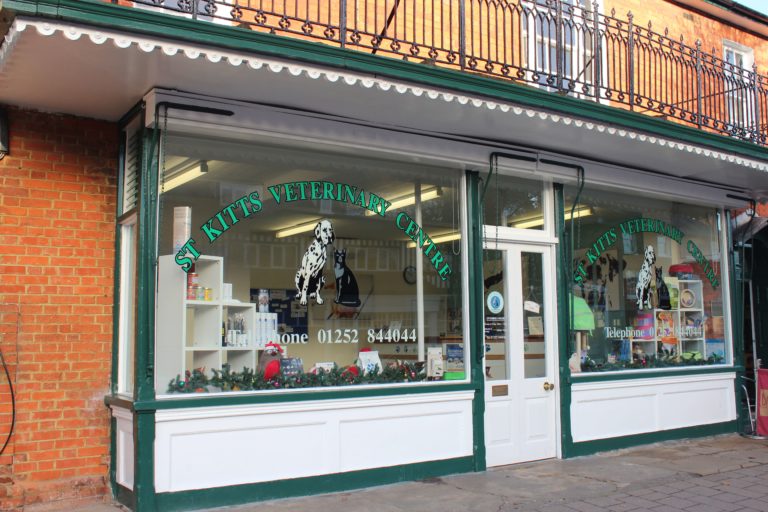
We’re delighted to share that we’ll be expanding our weekend services at Firgrove Veterinary Centre, which will enable clients of our Hartley Wintney practice to access urgent vet care, should it be needed. To support us with this, our Hartley Wintney practice will be closed on Saturdays from 2nd December 2023.
Going forward, these changes will allow clients who are registered at Hartley Wintney to utilise our weekend services at Firgrove, which is located in Yateley – less than a 5-mile drive away. With veterinary surgeons on duty and access to plenty of free parking, this makes our weekend services much more practical.
St Kitts Vets Basingstoke
Saturdays: 8:30am – 4pm
Sundays: 8:30am – 4pm
Firgrove Veterinary Centre, Yateley
Saturdays: 8:30am – 4pm
Sundays: CLOSED
Crookham Park Veterinary Centre, Fleet
Saturdays: 8:30am – 4pm
Sundays: CLOSED
St Kitts Vets Hartley Wintney
Saturdays: CLOSED
Sundays: CLOSED
We understand that these changes may cause some concerns with clients registered at our Hartley Wintney branch and what to do should you need us. To help, we’ve answered some of your most common questions and concerns below.
For clients registered to our Hartley Wintney practice, all three of our other clinics will remain open on Saturdays as normal. This means we’ll still be here to help, should you need us. Firgrove Vets in Yateley is our closest clinic, located less than a 5-mile drive from Hartley Wintney with plentiful free parking in two car parks either side of the clinic.
Yes! All our practices take emergencies during opening hours. Wherever possible, please call us in advance before arriving at the surgery.
Yes! The team who you will be familiar with seeing on Saturdays at Hartley Wintney will now be working alongside the Firgrove team, so you’ll know a face or two.
Hartley Wintney will not be open for collections on Saturdays. Instead, all orders placed on Fridays will be available for collection on the following Monday.
If your pet runs out of their medication, emergency orders can be placed with Firgrove on Saturdays and picked up on the same day.
Yes, as all our practices stock the same brands of pet food (subject to availability) Any food that’s been pre-ordered at Hartley Wintney can only be collected from here during our weekday opening hours.
All insurance claim forms can be posted through the front door at our Hartley Wintney practice on weekends. These will be picked up by our team on the Monday.
Yes! Patient records are interlinked between all of our practices.
Yes! We have weighing scales available for use in the reception areas at all of our practices.
Yes. However, please note that Saturdays are for urgent and emergency appointments only.
Yes. Laboratory samples for Hartley Wintney clients should not be posted through the door over the weekends.
Yes. Urgent laboratory reports that come back overnight on Fridays or Saturdays will be made available at Firgrove.
If you have any further questions about our new opening times, please contact us on 01252 844044 or info@stkittsvet.co.uk.
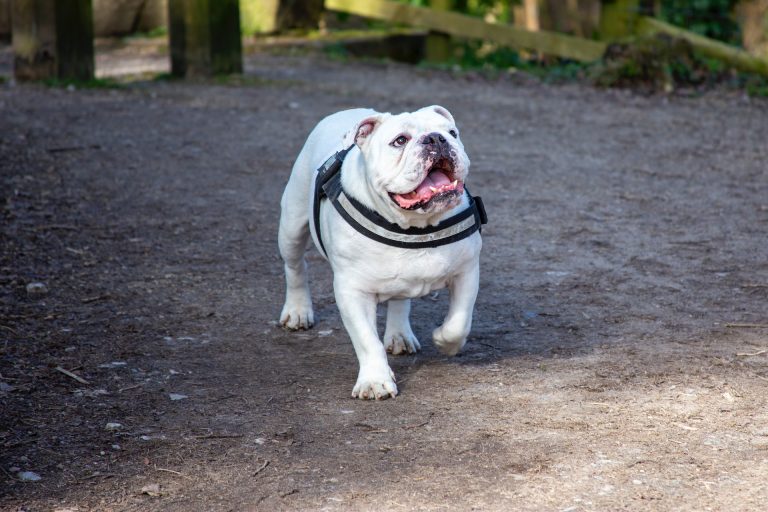
Flat-faced dogs and cats, also known as brachycephalic breeds, are undeniably popular thanks to their endearing smooshy faces and charming characters. These animals are known for their great personalities and form affectionate bonds with their owners.
Unfortunately, the physical features that tend to draw people to these breeds, like their flat faces, can mean they’re at greater risk of developing particular health problems down the line.
If you’re considering bringing a brachycephalic breed into your family, or have one already, it’s important to be aware of the common health issues so that you can seek the necessary treatment where required.
The term ‘brachycephalic’ comes from the Greek words meaning ‘short’ and ‘head’ and therefore describes animals whose faces appear flattened or squashed. Because of the unique shape of their heads, these breeds’ typically have narrow nostrils and smaller airways.
Some of the most popular brachycephalic breeds in the UK include:
Flat-faced dogs and cats can experience difficulty breathing, which can be extremely distressing. The clinical term is known as Brachycephalic Obstructive Airway Syndrome (BOAS) which refers to how their shortened heads can lead to restricted airflow.
These breeds have shorter muzzle bones in their skulls than animals with longer snouts, but often the soft tissue around the mouth, nose and throat is the same. This means the airway becomes narrowed or partially blocked as the tissue squeezes into a smaller space. Their windpipes and nostrils can also be deformed and narrow, so less oxygen can be taken in with each breath.
Symptoms to look out for include (but are not limited to):
If you own a flat-faced breed, it’s important to keep an eye on their breathing during exercise and hot weather, as they struggle to effectively cool themselves down by panting. This puts them at greater risk of overheating and suffering from heatstroke.
How St Kitts Vets can support brachycephalic breeds with breathing problems
We’re proud to have a close relationship with the team of dedicated peripatetic referral surgeons at ProVetSurg, who have partnered with us to provide our clients with a cost-effective assessment and treatment pathway for animals suffering with BOAS.

Our process includes detailed pre-operative assessments to determine whether surgery is required, along with extensive plans to minimise the risk of complications should this route be recommended.
You can find out more about our BOAS surgery here.
Overlapping and overcrowding teeth is unfortunately expected with flat-faced breeds, which can increase the risk of decay and gum (periodontal) disease and cause severe pain, as well as lead to other serious health problems, such as heart disease.
This is because flat-faced breeds have the same amount of teeth as those with longer snouts, but not enough space to accommodate them. Research by the Royal Veterinary College found flat-faced breeds have 1.25 times the risk of dental disease compared with breeds with medium-length skulls.
Symptoms to look out for include (but are not limited to):
How St Kitts Vets can support brachycephalic breeds with dental problems
Across our four practices, we are fully equipped with the equipment needed to diagnose and treat a range of dental conditions. Our facilities cover everything from dedicated dental suites and X-rays to descaling and polishing equipment.
With their flat faces and shallow eye sockets, Brachycephalic Ocular Syndrome (BOS) is a common concern amongst these breeds. Prominent and bulging eyes can mean their tear film doesn’t spread properly and they can easily develop eye ulcers, which can result in complications if left untreated.
Symptoms to look out for include (but are not limited to):
Meet Dotty, who was suffering from BOS
To help with Dotty’s eyes, a procedure called a medical canthoplasty was performed that makes the eye opening smaller and prevents any future problems. You can see what a huge difference the surgery has made for Dotty in her before and after below!
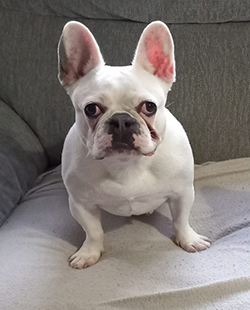
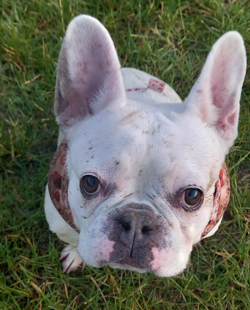
The shape of their heads means brachycephalic breeds often have narrowed ear canals. Their poorly ventilated deep skin folds around their ears can often lead to yeast infections too.
Symptoms to look out for include (but are not limited to):
With plenty of skin folds and wrinkles, flat-faced dogs and cats are at higher risk of allergic skin disease, infections and chronic itching, which can cause great discomfort. In most cases, lifelong medication is required.
Symptoms to look out for include (but are not limited to):
Flat-faced breeds with coiled or short tails, are at higher risk of spinal deformities. This can affect their ability to walk and cause paralysis of the back legs.
Symptoms to look out for include (but are not limited to):
We’ve looked at the breathing difficulties flat-faced breeds can face, but this can also put a strain on their hearts. Struggling to breathe results in a lack of oxygen in the bloodstream, which makes heart problems more likely.
Symptoms to look out for include (but are not limited to):
How St Kitts Vets can support brachycephalic breeds with heart problems
Vet Steve Williams and the team at our Hartley Wintney practice have been providing cardiology services for patients for the last 10 years. Steve himself has a particular interest in veterinary cardiology and has undergone significant training in this area.
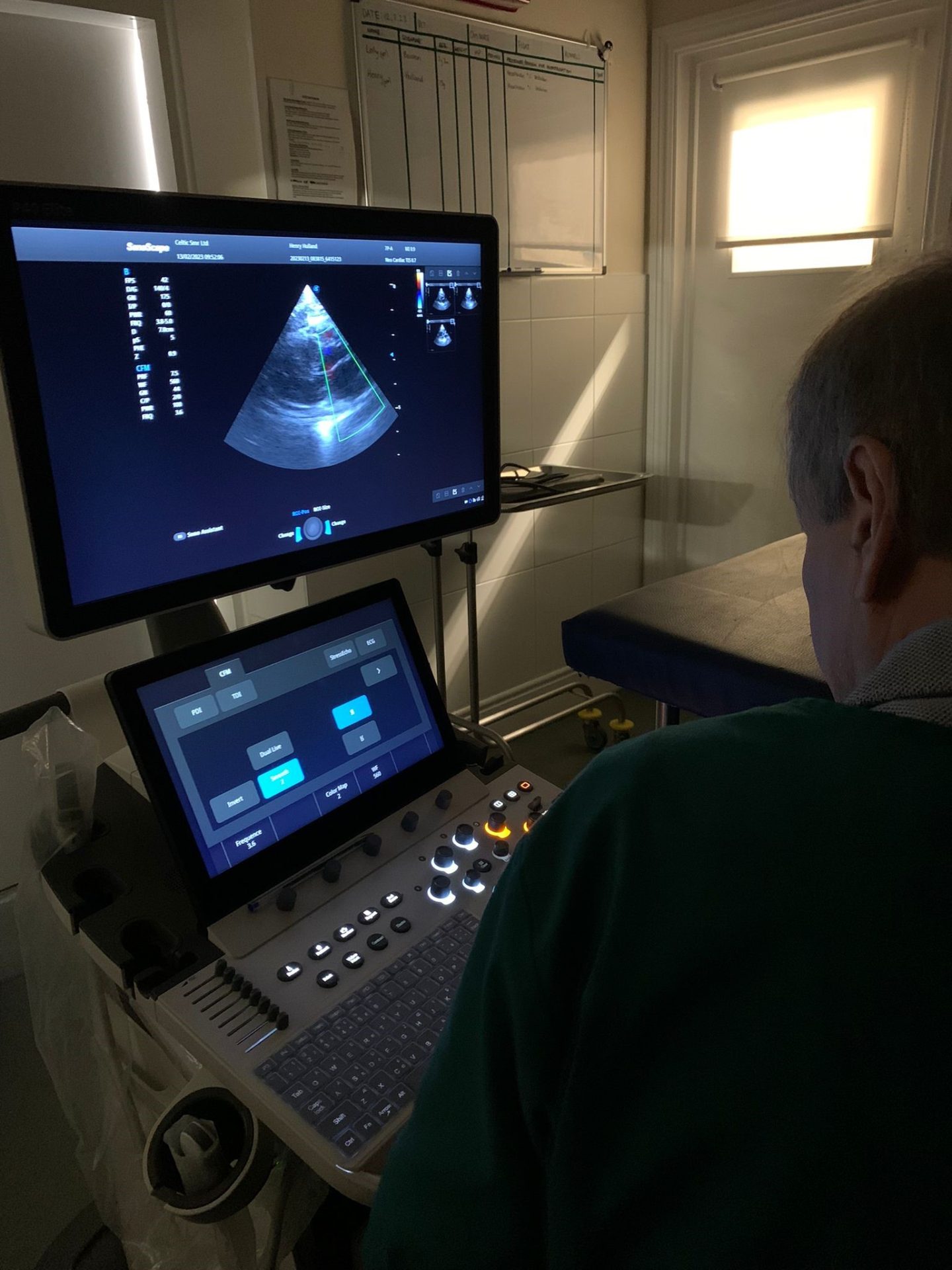
All our cardiology investigations are performed using modern specialist equipment, including high quality ECG, X-rays and ultrasound. We also have use of a state-of-the-art CT scanner at our Basingstoke practice.
You can find out more about our veterinary cardiology here.
Brachycephalic breeds can suffer from neurological (brain) problems because of their compressed skull shape. One of the most common, and unfortunately painful conditions, is Syringomyelia, where cavities or cysts form in the spinal cord. It is most often seen in Cavalier King Charles Spaniels.
Symptoms to look out for include (but are not limited to):
Unfortunately, owners of flat-faced breeds are likely to need to dedicate more time and effort in caring for their health than most other breeds. There are things you can do to improve their general wellbeing though, including controlling their weight and being mindful of things such as exercise in warm weather.
If you have any concerns about your pet’s health, please contact your local practice.
St Kitts Vets Hartley Wintney: 01252 844044
St Kitts Vets Basingstoke: 01256 844944
Crookham Park Veterinary Centre: 01252 913990
Firgrove Veterinary Centre: 01252 877799